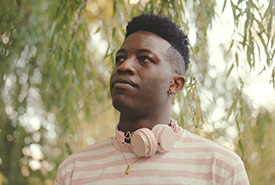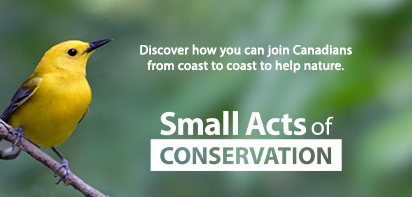Writing his own story

Chúk Odenigbo (Photo by Brianna Roye)
Chúk Odenigbo is creating a new narrative for what nature can look like in Canada.
Deep within the heart of Calgary, Alberta, you will find Chúk Odenigbo’s favourite place to escape into nature. Here, you can lose yourself within the tall trees and lush, green grasses. This one-hectare (two-acre) paradise boasts over 50 plant species. More than 500 trees surround you as you walk through winding paths, and exiting this oasis, you can smell the Chinese food restaurant nearby.
For Odenigbo, one of his favourite spots in nature is an indoor botanical garden located just across from the food court in the CORE Shopping Centre in downtown Calgary. It’s a place where urban dwellers like him can find peace in the most unexpected of places. “I have many favourite places in nature, and each place carries a special memory or feeling,” he says. “I love the Devonian Gardens because they are so accessible for people. The garden allows you to come into nature in the downtown core for a nature break, and be surrounded by trees and plants and everything that comes with that. I think this really encapsulates the idea of how nature is for all.” Odenigbo is a Black Franco-Albertan who literally grew up around the world. With parents who both work for the United Nations, as a child he would find himself in a different country every year or so.
“I was born in Geneva, Switzerland, during my parents’ honeymoon,” he laughs. “We left Switzerland soon after, and I’ve lived in so many different places since; all of which have deepened my love for nature and the environment.” Now living in Gatineau, Quebec, Odenigbo has struggled to see himself within the cultural and natural landscapes of Canada. He notes there are barriers for women, Indigenous Peoples and people of colour to access this country’s natural resources. Whether it be due to lack of nature education and representation in green media (nature/environment media), lack of access or safety concerns, Odenigbo is hoping to help break down the walls between people and nature.
“Growing up, my parents wouldn’t let me go camping,” he admits. “They told me, ‘if you wanted to go camping, we should have left you in a village in Africa.’” He adds that 94 per cent of Black people in Canada live in urban places. ”We’re the most urbanized population in Canada out of fear of being considered uncivilized [by non-Black people],” he reflects. Odenigbo believes that historic and contemporary contentious relationships between Black people and non-Black people have led to barriers for people of colour finding their place out on the land. He is driving the narrative and creating space for youth, women and people of colour to find their voice when it comes to protecting, enjoying and thriving in nature. Odenigbo is one of the founding directors for Future Ancestors Services Inc., an Indigenous- and Blackowned, youth-led professional services social enterprise. Launched in April 2020, the organization supports clients with advancing climate justice and equity through “lenses of anti-racism and ancestral accountability.”
“We are the ancestors of the future generation and we need to act with conscience,” he says. “We also recognize that we are the future of our ancestors, too, and know there are mistakes to fix from the past, and that it’s our responsibility to do so.” Odenigbo and the organization are challenging Canada’s “nature story” by encouraging others, especially those excluded from narratives, to rethink how we experience nature. Future Ancestors Services helps clients and the community to create and maintain meaningful relationships and address systemic issues that disadvantage groups of people.
“Nature culture [in Canada] has created barriers: a false dichotomy of what you need to do in nature,” he notes. “There is this idea that when you’re out in nature that you need to disconnect. But you don’t have to choose between technology and nature. We invite people to find their own way to connect. My favourite thing to do in nature is to sit under a tree and watch a movie on my iPad — seriously,” he laughs. Odenigbo is also a PhD candidate in medical geography at the University of Ottawa. His research focuses on relationships between human health, nature and culture.
According to Odenigbo, equality and promoting healthy people and natural areas means ensuring natural spaces in Canada are safe and accessible for all and can inspire people from all walks of life to help protect the land.
“Nature is for everyone, regardless of the colour of their skin or gender,” he states. “It’s important for people to experience nature in their own way. Once they do, they will be inspired to protect it.
This story originally appeared in the fall 2021 issue of the Nature Conservancy of Canada Magazine. To learn more about how you can receive the magazine, click here.
Explore additional content from our fall issue here >



